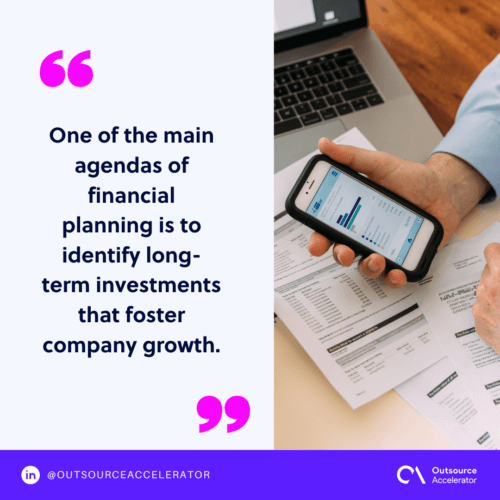Why financial planning is important for your business

This article is a submission by D&V Philippines. D&V Philippines has years of experience in the accounting and finance industry. This third-party services company can provide you with the back-office support you need.
A successful business doesn’t rely on luck. As the cliché goes, it makes its own. You can control certain factors that can push your company to the top of your industry.
One way to achieve your objectives is through careful financial planning.
A plan acts as your blueprint whenever you decide to allocate resources to different aspects of your business, whether it’s operations or product development. It also enables you to establish short and long-term financial goals you need to achieve for success.
This article explains why you must implement effective financial planning as your business grows.
9 reasons why your business needs financial planning
Here’s why financial planning is essential to your business:
1. Establish clear company objectives
You might want your company to grow even more, or you might want to maintain a certain level. Your financial position is one of the factors that dictate the trajectory of your business.
You’ll need financial planning to establish short and long-term objectives:
- Your short-term financial goals should meet the recurrent and regular cash needs of your operations.
- Your long-term financial objectives cover the plans and aspirations you have for your company. These include possible expansion projects, new products and/or services, marketing campaigns, implementing data-driven strategies, and others.
Clear, actionable, and attainable objectives allow you to move toward your main goal effectively while maintaining financial flexibility.

2. Effective management of cash flow
As your business grows, you’ll have more customers, more transactions, and more sales. You’ll need an effective way to manage the cash that goes in and out of your operations.
Positive cash flow brings many advantages, such as:
- Paying dues on time or possibly early
- Having more than enough money to fund short and long-term projects or campaigns
- Injecting resources to develop new or current products or services
- Improving customer retention programs
Financial planning enables you to manage where you spend your resources and which investments are worth pursuing. The plan also includes the challenges you might encounter and possible solutions to them.
3. Budget and resource allocation
Financial planning enables you to allocate your resources effectively. Your financial plan allows you to make budget projections and where you’ll direct your money.
Identify which projects, campaigns, processes, training programs, products, services, and others need funding.
Your financial plan also covers the budget you’ll allot for salaries, raises, bonuses, and other benefits you offer employees.
Determine your financial goals so that you’ll have a clearer idea of how you want to allocate your budget. Efficient allocation enables you to maximize your company’s resources, reduce costs, and boost profits.
4. Identify cost cuts
A financial plan enables you to identify ways to cut costs. You’ll be able to determine which aspects of your business operations consume resources effectively.
Separate the efficient operations and expenses from the rest. Assess if you’ll continue directing their current cash flow to these aspects of operations, completely stop, or reduce it.
They might still function efficiently despite the reduction in spending. You might find a different and more efficient process that requires less money.
The additional cash your business saves allows you to invest in your company and the development of your employees. The financial flexibility that savings provide gives you more growth options.
5. Reduce risks
It’s impossible to determine and eliminate risks completely; however, you can mitigate them and identify ones you can avoid.
Your financial plan serves as your roadmap as you navigate the challenges that your company may encounter. The plan you create includes the possible expenses your business might incur, such as:
- Insurance costs
- Inefficient processes
- Failed campaigns
- Projects that underperformed
- Emergencies
Factors such as economic crises and pandemics increase your business risk as well.
Financial planning allows you to prepare for worst-case scenarios. This enables you to create and implement contingency strategies that reduce risks and maintain a profitability level to overcome them.
6. Growth blueprint
Your financial planning also acts as your growth blueprint. It includes your company’s financial objectives in the short and long term. It allows you to follow phases in the growth of your business.
You can take a slow but steady approach or an aggressive one based on how fast you attain your goals. Assess your financial position on a regular basis so that you can adjust your budget and allocate resources to fit your company’s changing situation.
This keeps your company flexible whenever new opportunities or challenges arise. Your business might experience an unexpected surge in sales or incur unforeseen losses.
7. Determine trends in industry
If you’ve been in your niche for some time already, you’ll see trends that either result in sales upswings or lean times. Your financial planning sessions should account for these regular seasonal shifts.
Your plan allows you to identify the ideal time to focus your resources on a particular campaign that drives the most sales. Your targeted approach and spending enable you to customize a message that leads to a high conversion rate.
This strategy enables you to maximize your spending without having a negative effect on your cash flow.
8. Find worthwhile investments
One of the main agendas of financial planning is to identify long-term investments that foster company growth.
Look for possible investments that will give you a competitive advantage in your niche. This can be:
- New branch in a different city
- Possible passive revenue stream
- Your own storage space
- New products or services
- Expanding your consumer base
All these provide you with opportunities to expand your business and reach the top of your niche.

9. Measure and monitor progress
You’ll need a way to measure and monitor the progress of your financial goals to determine if you can stay the course or change strategies.
Your plan lays out the strategies you implemented to achieve your financial objectives. Analyze these to determine which approach delivers the highest return on investment.
The insights you gain allow you to improve on the strategies you already implement, find new practices that deliver results, and maximize your resources.
Financial planning is a catalyst that leads to success. It prepares you for worst-case scenarios, enables you to project earnings, losses, and expenses, and simplifies resource allocation.
If you need assistance with financial planning, D&V Philippines has the expertise and experience.
Contact D&V Philippines to learn more about its featured services.







 Independent
Independent




